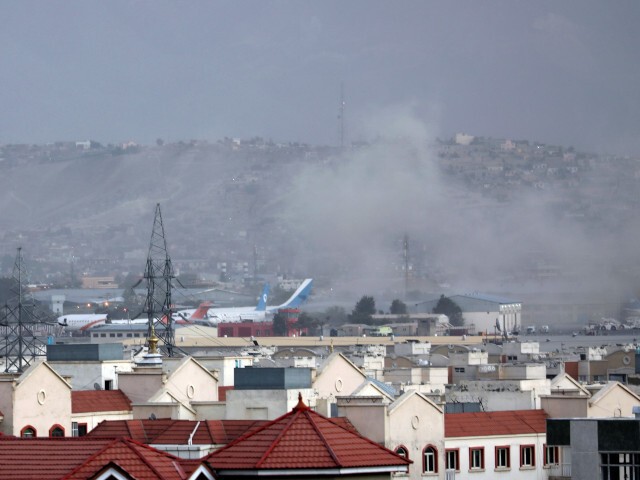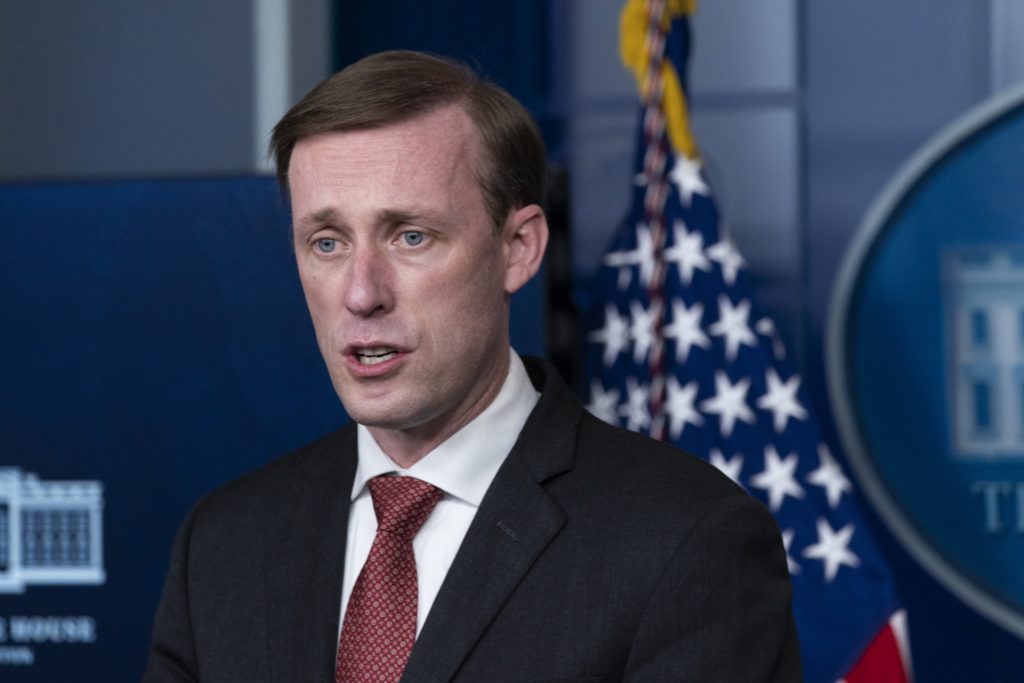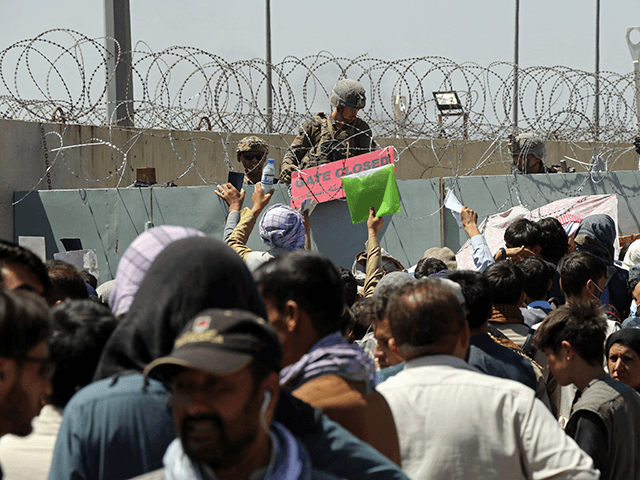U.S. officials on Wednesday evening warned of an imminent terrorist threat at the Kabul airport and instructed American citizens to leave several of the crowded airport gates immediately, following similar warnings from the Taliban terrorist organization.
At least one large explosion shortly followed the warnings Thursday morning.

Smoke rises from explosion outside the airport in Kabul, Afghanistan, Thursday, Aug. 26, 2021. The explosion went off outside Kabul’s airport, where thousands of people have flocked as they try to flee the Taliban takeover of Afghanistan. Officials offered no casualty count, but a witness said several people appeared to have been killed or wounded Thursday. (AP Photo/Wali Sabawoon)
The Biden administration and Taliban spokesmen both claimed the threat came not from the Taliban or its terrorist allies, but from the Islamic State, which has been fighting the Taliban for turf in Afghanistan for several years.
“Because of security threats outside the gates of Kabul airport, we are advising U.S. citizens to avoid traveling to the airport and to avoid airport gates at this time unless you receive individual instructions from a U.S. government representative to do so,” the U.S. Embassy in Afghanistan said in a bulletin on Wednesday.
“U.S. citizens who are at the Abbey Gate, East Gate, or North Gate now should leave immediately,” the embassy instructed.
“It’s hard to overstate the complexity and the danger of this effort. We’re operating in a hostile environment in a city and country now controlled by the Taliban, with the very real possibility of an ISIS-K attack. We’re taking every precaution, but this is very high-risk,” Secretary of State Antony Blinken said at a State Department briefing Wednesday.
“ISIS-K” refers to Islamic State-Khorasan Province, also known as ISKP, the Islamic State’s chapter in Afghanistan. “Khorasan” is the Islamic State’s name for the region that includes Afghanistan and Pakistan.
ISIS-K was founded in 2014 by disaffected Taliban fighters. Its current leader, Shahab al-Muhajir, was reportedly a mid-level commander in the Haqqani Network, a terrorist gang closely tied to the Taliban and allied with al-Qaeda before defecting to join ISIS-K. Haqqani leaders have paraded in Kabul alongside the Taliban as key players in the construction of a functional Taliban government in the past two weeks.
An anonymous source told Fox News on Thursday morning that the warning of a possible imminent attack, by vehicle bomb or suicide bomber, during the next 24 hours was judged “more likely than unlikely” based on reports from the British military.
British Armed Forces Minister James Heappey said he saw “much firmer” intelligence suggesting a possible suicide bomb attack by ISIS terrorists on Thursday, but offered no details. Alleged U.S. officials anonymously speaking to the threat also provided no evidence for why they felt it so imminent. Islamic State social media accounts and other sources have not published any notable propaganda indicating an evidence attack since the Taliban takeover.
“There is now very, very credible reporting of an imminent attack, and hence why the Foreign Office advice was changed last night, that people should not come to Kabul Airport, they should move to a safe place and await further instructions,” Heappey said. “I can’t stress the desperation of the situation enough.”
“The threat is credible, it is imminent, it is lethal. We wouldn’t be saying this if we weren’t genuinely concerned about offering Islamic State a target that is just unimaginable,” he added.
“I think there is an appetite amongst many in the queue to take their chances, but the reporting of this threat is very credible indeed. There is a real imminence to it,” he warned, referring to the people lined up outside the Kabul airport.
“Our guards are also risking their lives at Kabul airport, they face a threat too from the Islamic State group,” a Taliban official said Wednesday night.
Taliban spokesman Zabihullah Mujahid, on the other hand, dismissed the warning of an imminent terrorist attack as “not accurate” in a statement to the media.
The Biden administration has been issuing vague warnings about an ISIS threat over the past week.
“One of the contingencies we are very focused on, laser focused on, is the potential for a terrorist attack by a group like ISIS-K, which of course is a sworn enemy of the Taliban, so we will keep working to minimize the risks and maximize the number of people on planes,” White House National Security Advisor Jake Sullivan said last Thursday.

National Security Adviser Jake Sullivan speaks with reporters in the James Brady Press Briefing Room at the White House, Friday, March 12, 2021, in Washington. (AP Photo/Alex Brandon)
Sullivan repeated that the threat of an ISIS attack was “real,” “acute,” and “persistent” on Sunday.
“We’re also keeping a close watch on any potential terrorist threat at or around the airport, including from the ISIS affiliates in Afghanistan who were released from prison when the prisons were emptied. And because they are, by the way, to make everybody understand, that the ISIS in Afghanistan have been the sworn enemy of the Taliban,” President Joe Biden said on Friday.
On Sunday, an unknown person told CNN there was “a strong possibility ISIS-K is trying to carry off an attack at the airport,” while another anonymous source, allegedly in Kabul, said there was a “credible but not immediate threat by Islamic State against Americans at Hamid Karzai International Airport.” Neither offered any evidence for their claims.
Biden again stressed the ISIS-K threat on Sunday, once more emphasizing that ISIS is “a sworn enemy of the Taliban” with “a history of fighting one another.”
“But every day we have troops on the ground, these troops and innocent civilians at the airport face the risk of attack from ISIS-K,” Biden said.
Biden said on Tuesday there is a “growing risk of an attack” by the Islamic State on the airport.
“Every day we’re on the ground is another day we know that ISIS-K is seeking to target the airport and attack both U.S. and allied forces and innocent civilians,” he said.
ISIS-K is as vicious as any other branch of the Islamic State, but its numbers in Afghanistan are small and its efforts to capture territory from the Taliban have been largely unsuccessful.
“Right now we see them very focused on trying to establish their caliphate, the Khorasan caliphate, inside Afghanistan,” Gen. John Nicholson, commander of U.S. and NATO forces in Afghanistan, said in October 2016. ISIS-K began this effort by attacking rural Afghan villages and terrorizing their populations to obtain supplies and establish command centers.
The Russians claimed in May 2019 that 5,000 ISIS fighters were massing along the northern border of Afghanistan, a far higher estimate than the 1,500 to 3,000 ISIS fighters the U.S. State Department believed were operating in the country. The Pentagon said in 2017 that Afghanistan’s National Defense and Security Forces (ANDSF) were able to winnow the number of ISIS fighters in their country down to 1,000 with U.S. air support. Recent estimates of ISIS-K manpower hovered in the 1,000 to 2,000 range.
The now-former Afghan government believed ISIS manpower in their country surged as the Islamic State “caliphate” in Syria and Iraq collapsed, sending some Afghan fighters home and leaving others in search of new battlefields where the influence of ISIS could be extended. The surge of inbound fighters eventually subsided, and attrition from battles against the ANDSF and Taliban began thinning the Islamic State’s ranks.
A June counterterrorism report from the United Nations credited ISIS-K with conducting 77 attacks in Afghanistan during the first four months of 2021, compared to 21 attacks during the same period in 2020. Those attacks included ISIS gunmen attacking Kabul University and killing 22 people, and a rocket attack on the Kabul airport. The Taliban blamed ISIS for the horrific bombing of a Kabul girl’s school in May, while the Afghan government said the Taliban was responsible.

COMMENTS
Please let us know if you're having issues with commenting.